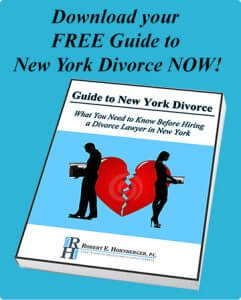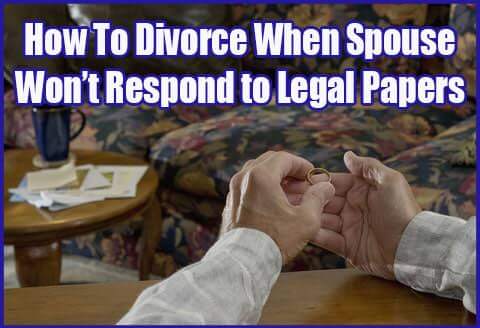Can I Get a Divorce in Nassau County or Suffolk County, Long Island without My Spouse?
As a Divorce Lawyer on Long Island, occasionally I will commence a divorce action on behalf of a client only to find out that his or her spouse refuses to cooperate. Naturally, this causes anxiety, stress and extreme discomfort for my client whose worst nightmare seems to be coming true. Clients think, am I really going to have to be married to my spouse for the rest of my life? Am I really going to have to own property with my spouse for the rest of my life?
However, a divorce attorney in Nassau County or Suffolk County likely knows something of which both you, and your spouse, may be unaware. If you commence an action for divorce and comply with all court rules and statutes, you can obtain a divorce even if your spouse refuses to cooperate and appear in the proceeding. This is known as a default judgment.
What is a Default Divorce Judgment?
A default judgment is a judgment in favor of the Plaintiff resulting from the Defendant’s failure to appear in a proceeding. The Defendant can appear by either answering the Summons with Notice, filing a motion to extend his or her time to answer the Summons, or filing a Notice of Appearance. New York state law requires the Defendant answer a Summons with Notice in a divorce action no later than twenty (20) days after service, if service was effectuated personally on the Defendant, or thirty (30) days after service if service was effectuated in any other manner. The Plaintiff is required to file an affidavit of service with the Court as proof that the Summons was served upon the Defendant.
What are the Advantages of a Default Divorce Judgment?
As a Long Island Divorce Attorney, the biggest advantage I can think of is the speed. A default divorce judgment is quick, and avoids expending large sums of money on attorney’s fees. Depending on the degree to which your spouse fails to cooperate depends upon how many court appearances are required. For instance, if you serve your spouse with a summons with notice, file an order to show cause and obtain temporary relief and appear before the Court for a Preliminary Conference (the first Court appearance in your matter) and your spouse neither complies nor answers at all, it is likely the Judge will set your matter down for an inquest shortly thereafter. An inquest is basically a one-sided divorce proceeding. Your attorney will ask you all requisite questions, including when you were married and all questions regarding jointly held property, and at the end, all you will need to do is wait to receive a certified copy of your Final Judgment of Divorce in the mail.
Additionally, no financial disclosure is required to issue a default divorce judgment. During typical divorce proceedings both parties must exchange tax returns, banking account statements, pay stubs and other relevant financial documents. If your spouse refuses to comply, there is no one to exchange these documents with, and therefore the same is not necessary.
What are the Disadvantages of a Default Divorce Judgment?
Often, spouses will fail to comply until they receive the Notice of Inquest in the mail. The noncompliant spouse will then run to the court house alleging he or she was never served with the many documents sent to them and therefore had no idea the action was pending. This may cause the inquest to be adjourned or even dismissed to permit your divorce proceeding to move forward normally.
Most alarming however is the fact that the Defendant may have up to one (1) year to vacate the default judgment. This means that if your spouse has a reasonable excuse for his or her default, your divorce judgment may be opened at any point throughout that year.
If you find yourself in a situation where your spouse refuses to comply or acknowledge your attempts to obtain a divorce in Nassau County or Suffolk County, a default judgment may be just what you need. However, you cannot purposefully obtain a default judgment; you must give your Long Island Divorce attorney accurate demographic information on your spouse, including his or her address, so service may be properly effectuated. The default judgment will be the result of your spouse ignoring any legal documents they receive.
Get a Free Consultation from an Experienced Long Island Divorce Lawyer Practicing in Nassau & Suffolk County
For more information about how to protect yourself and your children during your divorce in Nassau County of Suffolk County, contact a Long Island divorce lawyer with great experience in all divorce and family law matters. Long Island’s Robert E. Hornberger, Esq., PC and his compassionate and experienced divorce lawyers can help. Call us at 631-923-1910 for a complimentary, confidential consultation or fill out the short form on this page and we’ll get right back to you.
Download our Free New York Divorce Guide
 Our 41-page “Guide to New York Divorce: What You Need to Know Before Hiring a Divorce Lawyer in New York” written by an experienced divorce lawyer Long Island’s Robert E. Hornberger, Esq., provides you with real information on the divorce process and the laws it rests upon in the state of New York. This book will help give you a solid foundation upon which you can begin the process of making your family’s, life better. Download your Free Guide to New York Divorce here.
Our 41-page “Guide to New York Divorce: What You Need to Know Before Hiring a Divorce Lawyer in New York” written by an experienced divorce lawyer Long Island’s Robert E. Hornberger, Esq., provides you with real information on the divorce process and the laws it rests upon in the state of New York. This book will help give you a solid foundation upon which you can begin the process of making your family’s, life better. Download your Free Guide to New York Divorce here.













